Earlier this week, the Academy of Motion Picture Arts and Sciences resolved to overhaul its best picture Oscar eligibility standards because Hollywood has failed to become more inclusive.
A new report released Thursday dramatizes the problem that prompted the Academy's radical rules change.
For years, USC's Annenberg Inclusion Initiative has examined who gets to make movies — and who doesn't. Lead researcher Stacy Smith says in the latest report that Hollywood has made only "paltry progress" in overall diversity and done even worse in other areas.
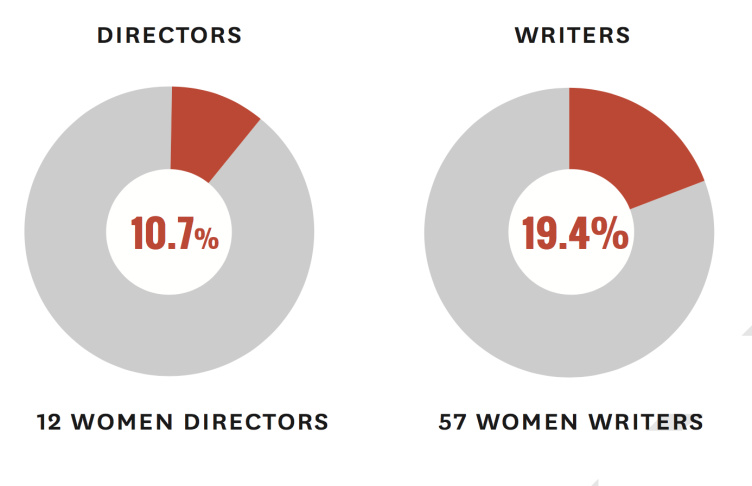 USC's Annenberg Inclusion Initiative's study of the top 100 grossing films in the in 2019 found wide gaps between men and women in many key filmmaking roles. (Courtesy Annenberg Inclusion Initiative)
USC's Annenberg Inclusion Initiative's study of the top 100 grossing films in the in 2019 found wide gaps between men and women in many key filmmaking roles. (Courtesy Annenberg Inclusion Initiative)THE NUMBERS DON'T LIE
Smith's team analyzed the Top 100 films at last year's box office, as they've been doing since 2007. The findings? The studios have made "little to no progress" in those 13 years for female characters and for performers from some underrepresented groups.
The divide between men and women remains steep. Just one-third of all speaking characters were played by women in 2019's most popular films. Only three of last year's top films had a leading or co-leading role played by a woman age 45 or older, and just one of these roles went to a woman of color.
The numbers were just as fractional for characters from underrepresented racial and ethnic groups. The gap is particularly wide for Latinos who make up about 18.5% of U.S. residents, according to census figures, but just 4.9% of speaking characters on screen in top films.
LGBTQ+ characters and people with disabilities were nearly invisible in last year's most popular releases.
"The erasure of girls and women from underrepresented racial/ethnic groups, the LGBTQ community, and those with disabilities remains a hallmark of top-performing Hollywood films," Smith said in a statement.
"After 13 years, it is not clear what might convince entertainment companies to change. Despite public statements, the data reveal that there is still apathy and ambivalence to increasing representation of speaking characters overall in popular films."
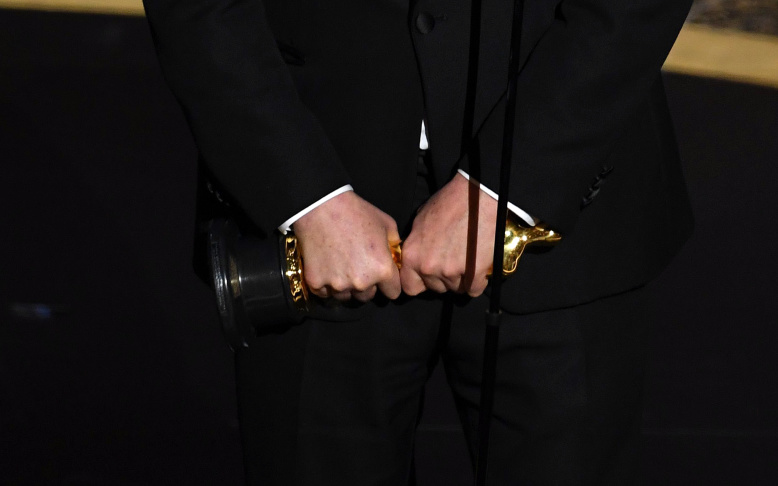 Joaquin Phoenix holds his Oscar statuette while accepting the Best Actor award for "Joker" at the Academy Awards on February 9, 2020. (Kevin Winter/Getty Images)
Joaquin Phoenix holds his Oscar statuette while accepting the Best Actor award for "Joker" at the Academy Awards on February 9, 2020. (Kevin Winter/Getty Images)SHAKING UP THE POWERBROKERS
The academy is trying to shake movie producers out of that diversity apathy, essentially telling them, If you don't clean up your house, you don't get to play in ours.
Under new Oscar rules, starting in 2024 a movie must pass at least two of four diversity and inclusion tests to qualify for the best picture statuette.
The new best picture eligibility standards call for at least one lead or supporting actor from an underrepresented racial or ethnic group or an ensemble that's at least 30% diverse. Another test is that a movie must have multiple department heads who are not white men.
The Academy will reward productions that have internships or training, marketing and audience engagement initiatives aimed at women and people of color.
 The Warner Bros in North Hollywood. The studio ranked low on a number of key diversity indicators, according to the latest report by USC. (Valerie Macon/AFP via Getty Images)
The Warner Bros in North Hollywood. The studio ranked low on a number of key diversity indicators, according to the latest report by USC. (Valerie Macon/AFP via Getty Images)IT'S NOT MUCH BETTER BEHIND THE LENS
The USC report also looked at who works behind the camera, and the data was equally bleak. One standout was Netflix, where female filmmakers are directing more than a fifth of its movies.
But among legacy studios, women directed fewer than 11% of the top films and they wrote the music for only 5% of those releases.
Interestingly, one area where women are overrepresented plays a major role in who gets hired: casting directors. The study found that 71% of the 1,300 films studied were cast by white women.
Warner Bros was at the bottom of many key measurements when it came to representation of women. The studio, most recently known for Christopher Nolan's Tenet, hired zero women to direct the films studied and featured female leads or co-leads in less than a quarter of its movies.
Article by: John Horn for LAist
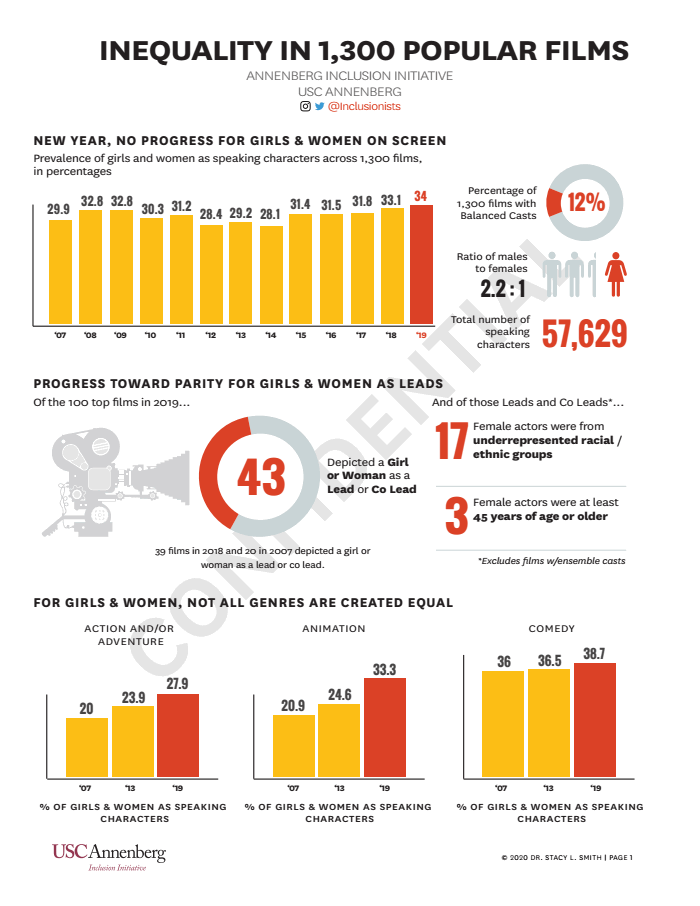
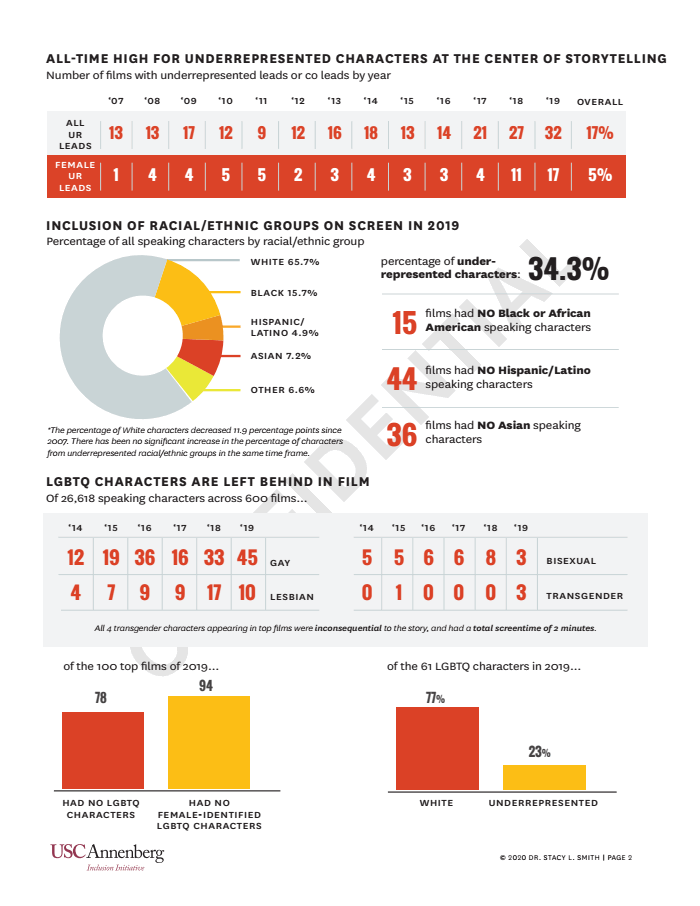
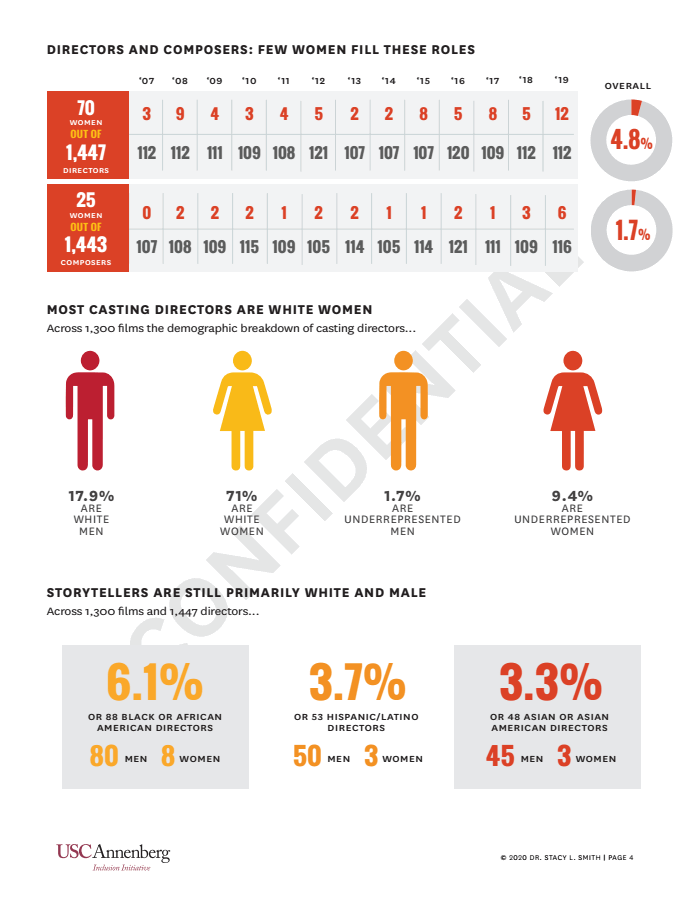
Comments